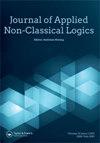Expressiveness of SETAFs and support-free ADFs under 3-valued semantics
Q1 Arts and Humanities
引用次数: 3
Abstract
AbstractGeneralising the attack structure in argumentation frameworks (AFs) has been studied in different ways. Most prominently, the binary attack relation of Dung frameworks has been extended to the notion of collective attacks. The resulting formalism is often termed SETAFs. Among the generalisations of AFs, abstract dialectical frameworks (ADFs) allow for a systematic and flexible generalisation of AFs in which different kinds of logical relations, e.g. attack and support, among arguments can be represented. Restricting the logical relations among arguments leads to different subclasses of ADFs of interest. In this work, we consider so-called support-free ADFs that allow for all kinds of attacks but no support or other relations and SETADFs that embed SETAFs in the ADF setting. The aim of this paper is to shed light on the relation between these two different approaches. To this end, we investigate and compare the expressiveness of SETAFs and support-free ADFs under the lens of 3-valued semantics. Our results show that it is only the presence of unsatisfiable acceptance conditions in support-free ADFs that discriminates the two approaches.Keywords: Abstract argumentation frameworksabstract dialectical frameworkscollective attack Disclosure statementNo potential conflict of interest was reported by the author(s).Notes1 We note this concept does not allow for auxiliary arguments that simulate certain behaviours, see e.g. Modgil and Bench-Capon (Citation2011).2 As discussed in Polberg (Citation2017), in general, SETAFs translate to bipolar ADFs that contain attacking and redundant links. However, when we first remove redundant attacks from the SETAF we obtain a SFADF.3 Recent work Dvořák et al. (Citation2021a) studies different types of symmetry in SETAFs. Our notion of symmetry corresponds the notion of primal-symmetric SETAFs without self-attacks in Dvořák et al. (Citation2021a)Additional informationFundingThis research has been supported by Austrian Science Fund (FWF) through projects I2854, P30168. The second researcher is supported by 1- the Netherlands Organisation for Scientific Research (NWO) through the Hybrid Intelligence Gravitation Programme, And 2- the Netherlands eScience Center project “The Eye of theBeholder”.3值语义下setf和无支持adf的表达性
摘要对论证框架中攻击结构的泛化问题进行了不同的研究。最突出的是,Dung框架的二元攻击关系已经扩展到集体攻击的概念。由此产生的形式主义通常被称为setf。在AFs的概括中,抽象辩证框架(adf)允许对AFs进行系统和灵活的概括,其中可以表示论点之间的不同类型的逻辑关系,例如攻击和支持。限制参数之间的逻辑关系会导致感兴趣的adf的不同子类。在这项工作中,我们考虑了所谓的无支持ADF,它允许各种攻击,但没有支持或其他关系,以及在ADF设置中嵌入setaf的setadf。本文的目的是阐明这两种不同方法之间的关系。为此,我们在3值语义的视角下对setaf和无支持adf的表达性进行了研究和比较。我们的结果表明,只有在无支持的adf中存在不满意的接受条件才能区分这两种方法。关键词:抽象论证框架抽象辩证框架集体攻击披露声明作者未发现潜在利益冲突。注1我们注意到这个概念不允许模拟某些行为的辅助参数,例如Modgil和Bench-Capon (Citation2011)正如Polberg (Citation2017)所讨论的那样,一般来说,setaf转化为包含攻击和冗余链接的双极adf。然而,当我们首先从SETAF中去除冗余攻击时,我们得到了一个SFADF.3最近的工作Dvořák等人(Citation2021a)研究了SETAF中不同类型的对称性。我们的对称概念对应于Dvořák等人的原始对称SETAFs无自我攻击的概念。(Citation2021a)额外信息资助本研究得到了奥地利科学基金(FWF)项目I2854, P30168的支持。第二名研究员由1-荷兰科学研究组织(NWO)通过混合智能引力计划和2-荷兰科学中心项目“旁观者之眼”支持。
本文章由计算机程序翻译,如有差异,请以英文原文为准。
求助全文
约1分钟内获得全文
求助全文
来源期刊

Journal of Applied Non-Classical Logics
Arts and Humanities-Philosophy
CiteScore
1.30
自引率
0.00%
发文量
8
 求助内容:
求助内容: 应助结果提醒方式:
应助结果提醒方式:


